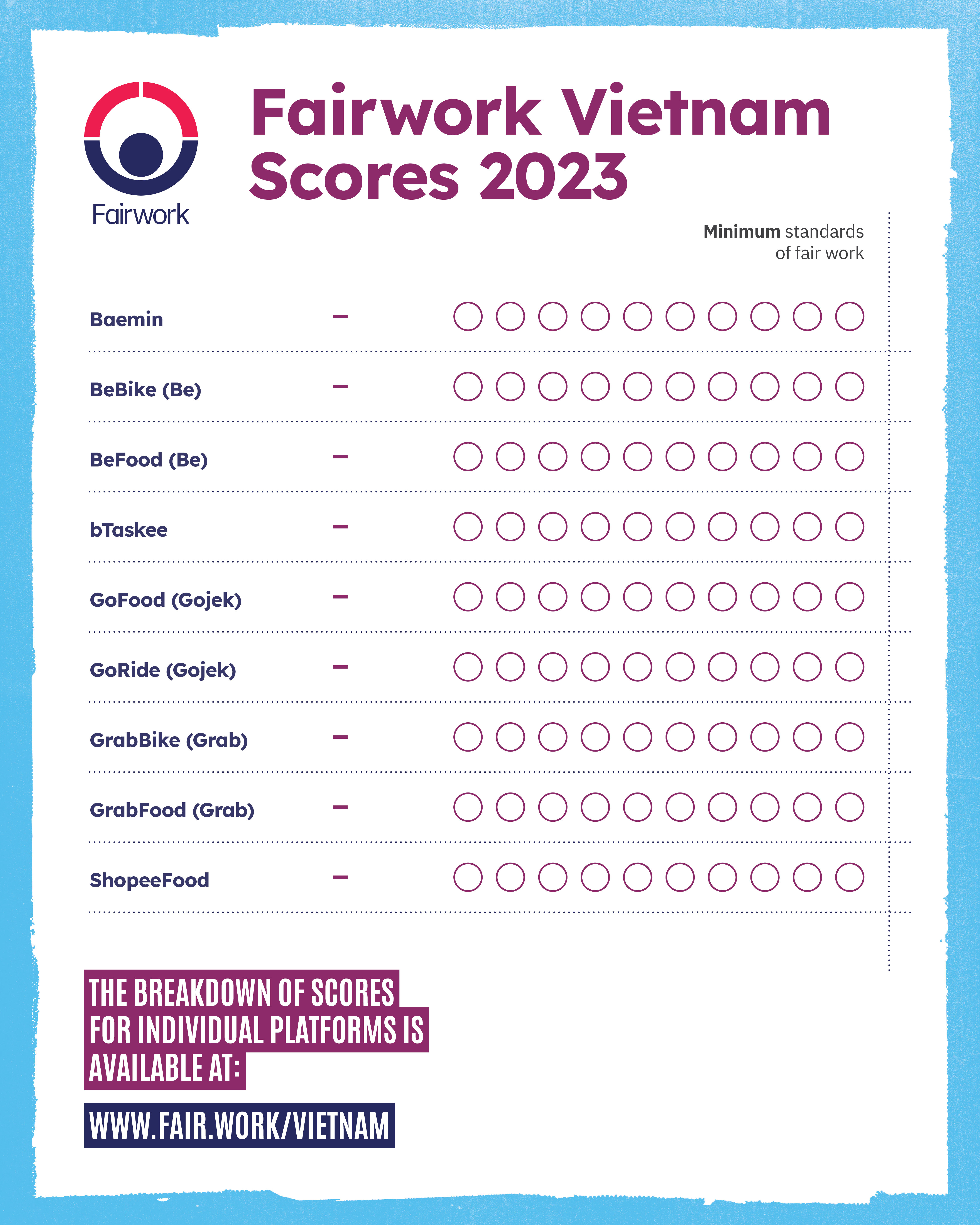New report provides the first assessment of working conditions in the Vietnamese platform economy

The first Fairwork Vietnam reports rates nine platforms across six of Vietnam’s most dominant digital labour platform companies: Baemin, Be (beBike and beFood), bTaskee, Gojek (GoRide and GoFood), Grab (GrabBike and GrabFood), and ShopeeFood. Of these, five offer food delivery services, three ride-hailing services, and one domestic services.
The first years of digital labour platforms in Vietnam, 2014 to 2018, were characterised by the battle for dominance between Grab and Uber. Grab won, and Uber exited Southeast Asia in 2018, in exchange for a stake in Grab. In a country where the motorbike is the preferred mode of transport, the overwhelming focus of researchers, journalists, policymakers and practitioners has been on platforms providing ride-hailing, food delivery, and courier services.
There is a danger, however, of erasing workers in other parts of the digital platform economy, such as those providing domestic services, private tuition, or remote work. Largely, this kind of work is performed in private homes, either of the worker or of the customer, meaning workers are less visible and therefore easier to be ignored by the public, policymakers, and practitioners. And while the majority of app-based drivers are men, workers for these other platforms are often women.
As with platform work in many jurisdictions, legal confusion as to the employment status of platform workers has left regulation attempts foundering. There is disagreement between and within relevant Ministries, as within the state-led Vietnam General Confederation of Labour (VGCL). Neither the VGCL nor the Ministry of Labour, Invalids and Social Affairs (MOLISA) has a position on whether digital platform workers are contractors or employees.
The Fairwork Vietnam report evaluates platforms from 0 to 10 points based on 5 principles of decent work. This year, no platform was awarded any points since there was no evidence that they met any of the criteria of fair work.
Ratings

Fair Pay: Although desk research and worker interviews indicate that workers for a few platforms may earn at least the local minimum wage after costs, no platform provided evidence to confirm this. Worker interviews for bTaskee suggested that workers potentially earn the local living wage after costs, but, again no evidence was found that the platform guarantees this. Additionally, Gojek provides a top-up income for both GoRide and GoFood workers who accumulate a determined number of points per day (based on the number of orders and riders a worker completes and the time of day they were undertaken) if their financial earnings remain under a certain threshold, likely bringing these workers’ incomes above the local minimum wage after costs. In neither case were we able to ascertain that all workers earned above minimum wage.
Fair Conditions: Research indicates that platforms do take some limited measures to mitigate risks, such as providing free annual health checks or some accident and injury insurance to workers free of charge (although many workers were unclear about what exactly this insurance is and what it covers). No platform, however, was awarded this point, largely because workers are made to pay for their own equipment, are only provided limited and unpaid safety training, and adequate measures to mitigate risks are not undertaken.
Fair Contracts: No platform was awarded points for this principle due to issues of unclear contract terms, platforms being able to make changes to their terms and conditions without prior notice, workers not understanding their contracts, contracts excluding platforms from liability for negligence, or unreasonably exempting them from liability for working conditions, and/or preventing workers from seeking redress for grievances that arise from the working relationship, as well as inadequate privacy policies. This is a very long sentence. Can you rewrite it into smaller ones?
Fair Management: All platforms have multiple channels of communication available to workers, including for deactivated workers. In addition to communication through the app, these channels include telephone hotlines, social media (especially Facebook and Zalo, a popular messaging app in Vietnam), and a physical office which workers can visit. No platform, however, provided sufficient evidence of the effectiveness of these channels. There was also no evidence of a documented process for appeals or of effective anti-discrimination policies. Therefore, no points were awarded.
Fair Representation: No platform was awarded this point in this year’s scoring round due to Vietnam’s legal and regulatory complexities.
What can I do? Fairwork Pledge
As part of Fairwork’s commitment to holding platforms accountable for their labor practices, particularly in promoting worker health, safety, and security, Fairwork invites Vietnamese organizations to announce their public support for decent working conditions in the platform economy by signing the Fairwork Pledge.
Organisations like universities, schools, businesses, investors and charities that make use of platform labour can make a difference by supporting platforms that offer better working conditions. Organisations have the option to sign up to the Pledge as an official Fairwork Supporter or an official Fairwork Partner. Those signing up to be a Supporter must demonstrate their support for fairer platform work publicly and provide their staff with appropriate resources to make informed decisions about what platforms to use. Becoming a Fairwork Partner entails making a public commitment to implement changes in their own internal practices, such as committing to using better-rated platforms when there is a choice.
More than 40 organizations, including GIZ, Solidarity Center, Learning Lions, WZB Berlin Social Science Center, and FES, have already signed the pledge. Join them in demanding a fairer future of work!